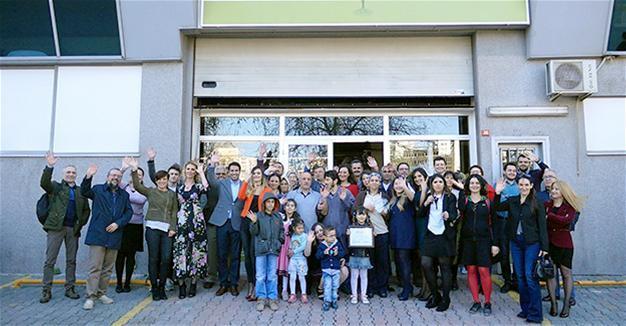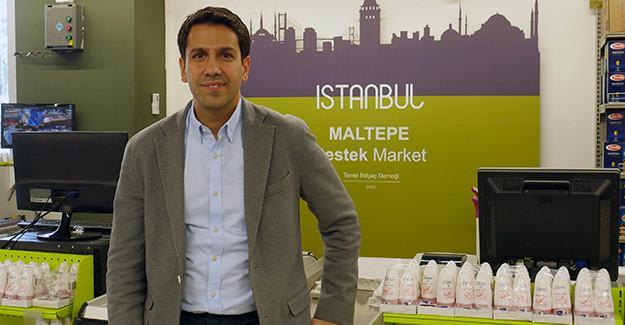TİDER wins global award for combining food aid with jobs
Nazlan Ertan - İZMİR

More than seven years ago, Serhan Süzer, a CEO in the fast-food sector, heard Bob Forney, the founder of the Global Food Banking Network, speak passionately on the need to bring surplus food to people in need. He then started a journey that would lead to Global Food Bank’s first-ever innovation award for his new approach to food banking: providing beneficiaries of the food bank to get back on their feet by finding them jobs.
“After the first 15 minutes of Mr. Forney’s speech, I was determined to be a part of the program that would bring the surplus food in the markets and food chains to the people who needed it,” Süzer told the Hürriyet Daily News about his first encounter with food banking. He had just been back from the United States where he received the innovation award on behalf of Temel İhtiyaç Derneği (TİDER - Basic Needs Foundation).
Moved by Forney’s passionate calls, Süzer and eight like-minded colleagues acted swiftly to establish a Food Banking Association, one of the first private initiatives in Turkey and the forefather of TİDER. The founders included Emine Feyhan Yaşar from Yaşar Holding, known for its Pınar dairy products; Melih Ödemiş, the co-founder of Yemek Sepeti, an online food command service, Can Ekinci, the ex-CEO of Starbucks; and Aziz Akgül, a former member of parliament who worked hard to enact a law that facilitated Turkish businesses to give away surplus or soon-to-expire food.
“It was clear that there was an acute need in Turkey,” Süzer said. “One out of every seven Turk lives under the poverty line. On the other hand, 325,000 tons of food, worth 414 billion Turkish Liras, is wasted every year. “
In Turkey, a bill which passed in 2004 provides tax exemptions to businesses and individuals who make donations to food banks. However, most of the food distributions are made through municipalities, rather than through NGOs.
“We also work with local authorities to ensure that we are able to reach people in need,” said Süzer. “But we also found places by ourselves, such as a school for students with mental disabilities in Mecidiyeköy. We worked hard to create a system that is fair, transparent and sustainable.”
 New market
New market
The turning point for the food banking initiative came with the creation of a “market” which provided a base for people in need to come and “buy” what they needed.
The association, rebranded with the name TİDER, changed its charter and started talks with municipalities and retailers to construct a market. With the help of Maltepe Municipality and Carrefour, the Support Market was founded in 2015. The market “sells” food, cleaning, personal hygiene and clothes, all donated by businesses and individuals. Impoverished families who are registered in Maltepe can come and get what they need, based on a weekly sum that is allocated to them. There is no transaction of money; text messages keep the beneficiaries up to date on their credits.
“We have reached 2,000 families in the last one year, providing them with 691,000 liras worth of basic needs products,” said Süzer, who added that a second market was on its way.
‘Teaching them to fish’
“The symbol of TIDER is a person standing up on his two feet,” said Süzer. “It reflects our priority to help people stand on their own feet and enjoy human dignity. That is why we came to launch our Support HR, a new dimension in our project to assist people in finding jobs while providing them with basic needs through the food bank.”
Support HR was designed as an “enabling” program, where the TİDER team worked hard to understand the individual’s life story and to list the skills the beneficiaries could use in professional life and match them with a suitable job. “It took a bit of an effort to persuade them that they could get a job; some had lost hope and others were very discouraged. We work with each individual to find a suitable job. We strive to help each family differently to match their individual needs,” Süzer said.
Support HR is the only human resource agency that runs as a non-profit and by an NGO in Turkey. TİDER charges fees from the hiring firms, and the revenue generated from the commission fees are used to cover operational expenses of the program. In its first year, revenue covered 35 percent of the program costs. The next step will be the creation of an e-platform that matches unemployed beneficiaries with companies. Job seekers will be able to identify opportunities in or around their own district. Similarly, hiring firms and organizations will be able to access profiles of candidates that come and use the Support Market.
Emine Can, who found a job as a cleaner at Eko Renewable Energy Inc., said Support HR provided her with her first regular job. “I always wanted to work but my husband never allowed me to. The officers of the association visited us at home once we started to benefit from the Support Market and told me they could find a job for me. They also convinced my husband, and my husband trusted the association. I have been working for one year and I am pleased to have a regular income. I feel I and my children are more secure,” she said.
After operating for more than a year, Support HR has already arranged interviews with 81 companies and assisted the employment of 56 food bank beneficiaries in 13 companies amid hopes of adding more in the future. “We expect that number to grow at an increasing rate, especially with the arrival of our e-platform,” Süzer said.
Süzer also maintains that TİDER’s Support HR project attracted the majority of its peers’ votes to win the award. A number of fellow food banks have already contacted them to receive further information and details.
 More than seven years ago, Serhan Süzer, a CEO in the fast-food sector, heard Bob Forney, the founder of the Global Food Banking Network, speak passionately on the need to bring surplus food to people in need. He then started a journey that would lead to Global Food Bank’s first-ever innovation award for his new approach to food banking: providing beneficiaries of the food bank to get back on their feet by finding them jobs.
More than seven years ago, Serhan Süzer, a CEO in the fast-food sector, heard Bob Forney, the founder of the Global Food Banking Network, speak passionately on the need to bring surplus food to people in need. He then started a journey that would lead to Global Food Bank’s first-ever innovation award for his new approach to food banking: providing beneficiaries of the food bank to get back on their feet by finding them jobs.